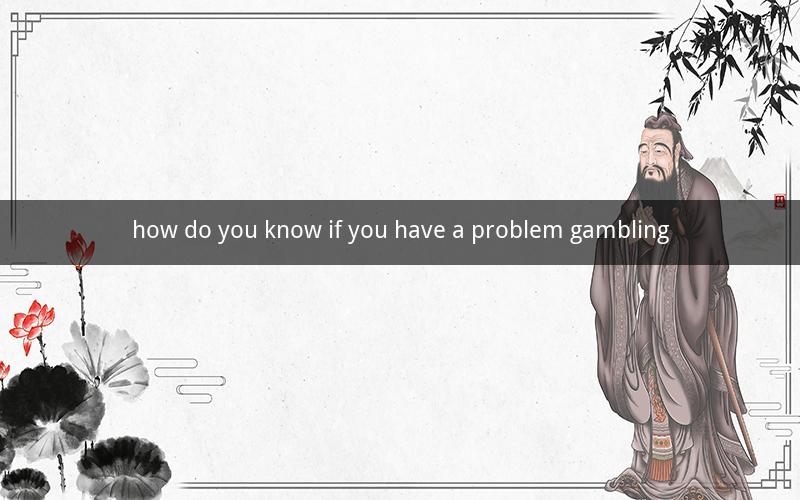
Table of Contents
1. Understanding Problem Gambling
2. Signs and Symptoms of Problem Gambling
3. The Impact of Problem Gambling on Personal Life
4. Recognizing Problem Gambling in Others
5. The Role of Technology in Problem Gambling
6. Treatment and Support for Problem Gamblers
7. Preventing Problem Gambling
8. The Importance of Education and Awareness
9. Legal and Ethical Considerations in Problem Gambling
10. The Future of Problem Gambling Research
---
1. Understanding Problem Gambling
Problem gambling, often referred to as gambling disorder, is characterized by a problematic pattern of gambling that leads to significant harm or distress. It is essential to recognize that gambling is a form of entertainment, but when it becomes uncontrollable, it can have severe consequences.
2. Signs and Symptoms of Problem Gambling
Several signs and symptoms can indicate that an individual may have a problem with gambling. These include:
- Continual desire to gamble, often leading to unsuccessful efforts to stop or control gambling.
- Restlessness or irritability when attempting to cut down or stop gambling.
- Gambling to escape problems or relieve negative feelings.
- Lying to family, friends, or therapists about the amount of time or money spent on gambling.
- Using money meant for important expenses, such as rent, utilities, or groceries, to gamble.
- Borrowing money or selling personal property to finance gambling.
3. The Impact of Problem Gambling on Personal Life
The consequences of problem gambling can be far-reaching and devastating. It can lead to financial, emotional, and relational problems, including:
- Financial difficulties due to debt and loss of assets.
- Marital and family problems, including separation and divorce.
- Mental health issues, such as depression, anxiety, and substance abuse.
- Legal problems, such as theft or embezzlement to fund gambling.
4. Recognizing Problem Gambling in Others
Identifying problem gambling in others can be challenging, but there are certain behaviors to watch for, such as:
- Secretive behavior, including hiding gambling activities or lying about the amount of money spent.
- Increased time spent online or in casinos.
- Neglecting responsibilities at work, school, or home.
- Signs of stress, anxiety, or depression.
5. The Role of Technology in Problem Gambling
The advent of technology has made gambling more accessible than ever before. Online casinos, mobile apps, and virtual reality gambling platforms have all contributed to the rise in problem gambling. It is crucial to be aware of the potential risks associated with these technologies.
6. Treatment and Support for Problem Gamblers
Treatment for problem gambling can include therapy, support groups, and self-help strategies. Cognitive-behavioral therapy (CBT) is particularly effective in addressing the underlying causes of gambling addiction. Support groups, such as Gamblers Anonymous, can provide a sense of community and shared experiences.
7. Preventing Problem Gambling
Prevention strategies include:
- Educating the public about the risks of gambling.
- Implementing responsible gambling policies in casinos and online platforms.
- Providing resources for individuals who may be at risk of developing a gambling problem.
8. The Importance of Education and Awareness
Raising awareness about problem gambling is crucial for early detection and intervention. Education can help individuals recognize the signs of problem gambling and seek help before the situation worsens.
9. Legal and Ethical Considerations in Problem Gambling
There are legal and ethical considerations surrounding problem gambling, including the responsibility of gambling operators to promote responsible gambling practices and the need for legislation to protect vulnerable individuals.
10. The Future of Problem Gambling Research
Research into problem gambling continues to evolve. Future studies may focus on the impact of technology, the effectiveness of various treatment methods, and the role of genetics in gambling addiction.
---
Questions and Answers
1. Q: What is the most common form of gambling among individuals with a problem?
A: The most common form of gambling among individuals with a problem is slot machines, followed by sports betting and online gambling.
2. Q: Can problem gambling be treated?
A: Yes, problem gambling can be treated, and many individuals have successfully overcome their addiction with the right support and treatment.
3. Q: How can I help a friend who I suspect has a gambling problem?
A: You can offer support by listening without judgment, encouraging them to seek professional help, and helping them develop healthy coping strategies.
4. Q: Is there a genetic component to problem gambling?
A: Yes, research suggests that there is a genetic component to problem gambling, with a higher incidence of gambling addiction in individuals with a family history of addiction.
5. Q: Can problem gambling lead to suicidal thoughts?
A: Yes, problem gambling can lead to severe emotional distress, which may increase the risk of suicidal thoughts and behaviors.
6. Q: Are there any medications that can help treat problem gambling?
A: There are no medications specifically approved for the treatment of problem gambling, but some medications may be used to address underlying mental health issues associated with gambling addiction.
7. Q: How can I protect myself from developing a gambling problem?
A: You can protect yourself by setting a budget for gambling, only gambling with money you can afford to lose, and being aware of the signs of problem gambling.
8. Q: Can problem gambling affect children?
A: Yes, children of individuals with problem gambling may be at risk of developing gambling problems themselves due to the influence of their environment.
9. Q: Are there any support groups available for family members of problem gamblers?
A: Yes, there are support groups, such as Gam-Anon, specifically designed for family members of individuals with gambling problems.
10. Q: How can I find out more about problem gambling and its treatment?
A: You can find more information about problem gambling and its treatment by visiting websites like Gamblers Anonymous, the National Council on Problem Gambling, or by speaking with a mental health professional.